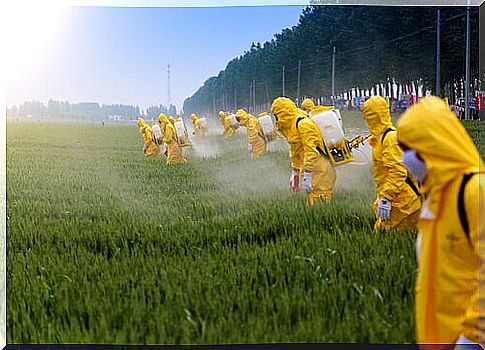The Effects Of Pesticides On The Brain

The effects of pesticides on the brain can be especially severe in the face of prolonged exposure. Every year, the chemical industry removes hundreds of products that are currently on the market. Many of them seemed safe, but they actually have high doses of toxicity.
Pesticides are a broad group of heterogeneous chemical compounds. They are mainly used to kill insects, weeds, fungi and rodents. Although they provide a certain benefit to the public by increasing productivity in agriculture, they pose a health risk due to their potential adverse effects.
We are exposed to a huge amount of chemicals these days. However, not enough laboratory tests were performed to rule out its toxic effects in all cases. It can also happen that the pesticide by itself does not harm the body, but the mixture of various components can cause devastating negative consequences in the long term.
On the other hand, the effects of pesticides are especially serious for children. Exposure to contaminating chemicals, even at low levels, can affect your brain development. This happens even during the pregnancy process. If this situation is prolonged, several areas can be affected. These substances can even contribute to the appearance of disorders such as attention deficit and autism.
Effects of Pesticides on the Brain: Early Studies
In 1962, ‘Silent Spring’, the book by biologist and conservationist Rachel Carson, was published. This is considered the first work that contributed to the beginning of modern environmental awareness. The book warned, for the first time, of the harmful effects that pesticides have on the environment, and it caused such alarm that the US government was forced to ban the use of the popular DDT.
Throughout the 70s and 80s, several studies emerged that talked about the effects of pesticides on the brain. Thus, groups of scientists demonstrated that prolonged exposure to organochlorine pesticides caused changes in the central nervous system (CNS).
In most cases, deficits in learning and memory were observed. In addition, motor and behavioral changes were also presented.
Consequences of prolonged exposure to pesticides
Pesticides can be toxic to both humans and animals. Some toxins are so strong that only a small amount is needed to be lethal. However, there are less aggressive toxins that do not cause immediate damage. Their danger exists because they are capable of doing harm in the long run.
One must understand that pesticide toxins can remain in the body for a long time. The body can react to them in different ways. This will depend on several factors: exposure time, type of pesticide and personal resistance to chemicals.
Pesticides and Alzheimer’s
The study of this neurodegenerative disease continues to challenge researchers around the world. Fortunately, we are able to understand it more and more these days.
A study published in the journal JAMA Neurology speaks of the importance of the environment in Alzheimer’s disease. This research came to the conclusion that being exposed to a pesticide such as DDT increases the risk of suffering from this disease.
This type of pesticide was used until the mid 70’s in the United States. In Brazil, in 2009, DDT had its manufacture, import, export, maintenance in stock, sale and use prohibited.
To link pesticides to Alzheimer’s disease, a study was conducted with two groups of patients suffering from this neurodegenerative disease. From the conclusions reached, it could be drawn that those sick people with high levels of pesticides in their blood had developed more severe cognitive impairment than people in the other control group. Members of the other control group had also developed the disease, but were “clean” in their blood.
Data like these on the effects of pesticides on the brain is very important. However, this link would explain only some cases of Alzheimer’s, not all. Even so, it is one of the studies that shows as clearly as possible a correlation between pesticides and this neurodegenerative disease.

Pesticides and autism
Although autism has an important genetic component, the environmental component is also relevant. One of the risk factors that increases the likelihood of developing autism is exposure to pesticides during pregnancy.
For example, in a study conducted at the University of California, exposure to pesticides and other compounds during pregnancy could be linked to the development of this disease.
The conclusion drawn is that exposure to pesticides can alter placental DNA methylation more than the other factors studied. This can change the functioning of this organ and alter the baby’s development. Thus, the chances of suffering from autism are increased exponentially.
Pesticides and Parkinson’s
Parkinson’s disease is a chronic neurodegenerative disorder. There is destruction, for unknown causes, of neurons that act in the central nervous system. Neurons use dopamine as a primary neurotransmitter, in charge of transmitting the information necessary for the correct control of body movements.
A group of scientists led by Dr. Francisco Pan-Montojo confirmed that one of the effects of pesticides on the brain is to increase the chances of suffering from Parkinson’s disease. Different epidemiological studies confirm that there are certain toxic substances capable of producing the symptoms of this disorder.
As we have seen, the use of pesticides is very controversial and will become even more so as we become more aware of their effects on the brain. Without them, modern agriculture would not exist as we know it.
But how much help do they help us if they cause so many illnesses? The debate is at its height, and it is very likely that we will encounter new pesticide-related problems in the coming decades.









